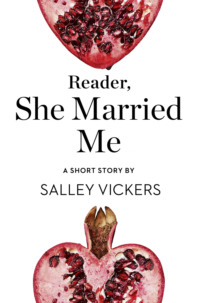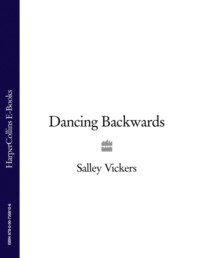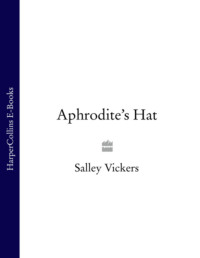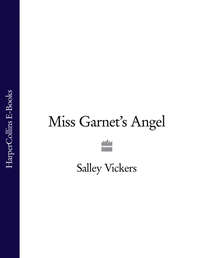
Полная версия
Mr Golightly’s Holiday
Mr Golightly was taken by the idea of ‘Fancies’. He liked the look of this shop and entering felt at once at home among the curious collection of bric-a-brac. Here were dyes, bath plugs, colanders, tea cosies, flour sieves, screws and hooks and brass bolts of all sizes, slug pellets, hot-water bottles, jam covers, lemon squeezers, thermos flasks and hurricane lanterns. In particular there was a milk jug in the likeness of a cow. Mr Golightly lingered a little over the cow but in the end he bought a hot-water bottle with a knitted cover, some clothes pegs, shaped like little wooden people with stiff legs, some electric plugs and a packet of firelighters.
The door of the shop was fitted with an old-fashioned bell which raucously announced the arrival of Johnny. Mr Golightly pointed out the cow. ‘Me mum would like that,’ Johnny observed. ‘Eight pound forty-nine,’ he said, before the elderly man at the till had had time to ring up the items.
‘How did you work that out?’ Mr Golightly asked.
‘Did it in me head.’
‘Did you now,’ said Mr Golightly. He had heard about savage child geniuses and hoped to goodness he hadn’t got one on his hands.
8
SAM NOBLE HAD BEEN DISAPPOINTED THAT HIS brief conversation with the tenant at Spring Cottage had offered no purchase for the story of the Palme d’Or. The residents of Great Calne had all heard about it – many several times.
The opportunities to repeat the account of his brush with success had diminished over the five years since Sam had moved from London to the village after his divorce from Irene. Sam sometimes regretted parting from Irene. At the time the world had presented itself as his oyster. The separation had occurred after the near miss at Cannes and had been speeded on its way by a temporary association with an air hostess from Malta. But the oyster seemed to have clammed up since, and such pearls as may have been lying in wait remained ungarnered.
It was true that Irene had not been inspiring: she had wittered on, and long before the intervention of the air hostess Sam had ceased to pay her attention. But nowadays he sometimes missed her chattiness, her observations about the garden and whether they should use chemical pesticides on the patio moss, or go for something organic. There were times when he even missed her warm, comfortably ageing body in the bed beside him.
Sleeping alone in the double bed – which, since it had become available for legitimate double occupancy, had remained depressingly single – had eroded Sam’s confidence. He dreamed fitfully about naked women jockeys and woke in the mornings too early. Dr Rhys at the Oakburton surgery had even discussed Prozac with him but, in the end, Sam decided he preferred to go it alone without anything chemical. After all, he still had a brain – or liked to think he did!
Dr Rhys was young and handsome and believed in the Hippocratic oath. That, and his sympathetic manner, meant he got lumbered with all the psychological stuff. He had suggested that maybe Sam might like to ‘talk’ to somebody. But Sam feared the ‘somebody’ might mean the lady vicar, who was training as a counsellor. Everyone knew she had a bee in her bonnet about male sexual performance. She had alarmed George, who dug the graves and helped out down at Folly Farm with the lambing, during bereavement counselling by asking questions which were hardly decent when you thought that his wife of fifty years was barely cold in her grave. And the grave dug lovingly by her grieving husband’s own two hands too! But these days it was all live-in sex and what the lady vicar worryingly referred to as ‘seeing to yourself’, with precious little about the rites of holy matrimony.
Sam had no particular concerns about the Church of England’s attitude to sexual habits, or to anything else for that matter. He had lived most of his working life in Hampstead and was a confirmed social atheist. But he didn’t care to be asked about his morning erections, particularly not by a lady vicar. George, it was rumoured, had been encouraged to plot a graph.
In any case, it was not attentions of that kind he necessarily craved; it was intellectual stimulus. The empty early mornings had produced a new idea for a creative project – a film about sheep dog trials. According to Nicky Pope, this chap who’d moved into Spring Cottage was a writer. He would probably welcome a chance to hear about Sam’s contacts in the film trade.
Mr Golightly’s first day of writing had been a washout. The shopping excursion with Johnny had protracted into lunch. The cottage had been chilly on their return, and the boy, off his own bat, had read, and apparently comprehended, the instruction book for the wood-burning stove. A miracle, Mr Golightly couldn’t help thinking, and far more useful than some he had known. The impossible-looking diagrams had seemingly been clear as daylight to Johnny, who had flicked, switched and adjusted knobs and had even managed to open the firelighters, which were packed so impenetrably that they defeated Mr Golightly. After that it would have been churlish not to offer to share his modest lunch, though, from the way Johnny had wolfed down the rolls, they could have done with the species of miracle which multiplies.
Johnny had left just after four and by the time Mr Golightly had washed up and checked his e-mails again, dealt with a question from Muriel – it was shocking what the government took you for VAT these days – it was far too late to begin a day’s work. Instead, he strolled up to the Stag and Badger, where he adroitly avoided conversation with Sam Noble by helping out the young poet in the woolly hat again with his crossword.
Mr Golightly was a crossword addict, a passion he shared with Muriel at the office and over the years he had fallen into the habit of doing The Times crossword with her. One reason for reading the dictionary was to pick up unusual vocabulary which might crop up, since it is well known that crossword setters are of the tribe of fiends. It had once been put to him that in the beginning was the word, and although in his own view things were both simpler and more complicated than that, it was a theory he had sympathy for.
Long ago Mr Golightly had discovered the principle of synchronicity, the law of meaningful coincidence, and it was following its signs in his business practices which was perhaps responsible for their general success. So he was not too surprised when four down in The Times read, ‘a deprived adolescence provides succour (6)’.
‘Uberty!’ said Mr Golightly, blatantly disregarding Luke’s chance to have a shot at the clue.
Luckily, Luke was not competitive. ‘What’s that? Never heard of it.’
But at that moment a thickset young man with a loud jacket, exuding a smell of aftershave, equally loud, made his way towards the bar.
‘Evening. Wolford, Brian Wolford.’ The man held out a well-cushioned hand. Perhaps it was the overpowering smell of the aftershave but Mr Golightly withheld his own. Rather deliberately he picked up his pint mug.
‘Golightly,’ he said. ‘You know Mr Weatherall?’
‘You’re the writer chappie,’ said Wolford, ignoring Luke. He made it sound like an accusation.
‘My friend is a writer too,’ said Mr Golightly, distinctly.
But Luke was more interested in the crossword clue. ‘So what’s it mean, then?’
‘Funny thing’, said Wolford, ‘I work up at the prison yonder. You come across some pretty weird stuff there. I’ve often thought of writing a book about it. Might drop round your place and have a natter. We’ve all got a novel in us, right?’
‘Uberty?’ Mr Golightly said, pointedly addressing only Luke. ‘It’s the milk of human kindness,’ he explained, a trifle vaingloriously.
The next morning saw Mr Golightly more than ever determined to get the soap opera under way. Staring out of the window for inspiration he saw the horse, Samson, standing four-square in the greensward. Columns of fine rain were blowing in misty battalions across the fields. A kestrel, resting magisterially on pillows of air, circled above the low-falling rain. Kingdom of daylight’s dapple-drawn dawn falcon…Mr Golightly found he was suddenly overcome by a need for coffee.
But, maddeningly, he had forgotten that the boy had finished off all the milk yesterday.
Up at the shop the bearded Steve said, with evident satisfaction, ‘Out of milk, I’m afraid, even the long-life. Got soya, though, that do you? Weather’s all right for those as has webbed feet.’
Mr Golightly did not care for soya in his coffee. He bought a small tin of evaporated milk and returned glumly down the hill. Yesterday’s buoyancy had deserted him. The unwritten soap opera had become an unresponsive lover, one who resists the most ardent attentions.
Coffee with evaporated milk did not improve his mood but, nevertheless, by 10 a.m. Mr Golightly was once again seated at the gateleg table. Better check the e-mails in case there was something at the office…
Three messages, heralded by their zippy musical accompaniment, materialised in the ‘Inbox’. One from Muriel, to do with one of the many unpaid accounts they were increasingly having to hassle for, one from a firm selling timeshares in Spain – Mr Golightly paused to wonder how ‘time’, which was indivisible, could conceivably be ‘shared’ – and one from yesterday’s anonymous correspondent:
hath the rain a father?
it asked.
Mr Golightly did not know what to think. He was too unpractised in the art of e-mail to be able to decipher any clue to the questioner’s identity, and while he didn’t want to reveal that he was the victim of an anonymous correspondent perhaps an e-mail to Mike was called for. He thought a moment then tapped out:
‘Dear Mike,
If someone e-mails me how do I know who they are?
And how do I reply to them?’
He pondered a moment more and then concluded:
‘Yours ever, Golightly’.
Mr Golightly had never had occasion to write to Mike before, or any of the office staff. It made him realise how little he really knew about ordinary channels of communication. Alone in Spring Cottage, with no one by to protect or defend him, he experienced an unfamiliar sense of vulnerability.
The marching columns of rain had dissolved into a uniform drizzle and Mr Golightly thought he might stretch his legs before starting work. The River Dart was flowing into hills covered today by a modest décolleté of mist and seagulls had winged their way inland suggesting rough weather out at sea. The air was laden with moisture, but Mr Golightly had spent much of his existence under sun-parched skies and the cool wash of English country air was a welcome balm.
He stood with the mild wetness anointing his face. He had to admit it, he was rattled: not merely by the fact of the phantom e-mailer but by the nature of the message. The references to fatherhood and the coincidence of the rain gave the impression that his unknown correspondent was peering at him knowingly – a feeling that challenged his usual security.
Back inside, the ‘Inbox’ announced that he had received another e-mail. Opening it, he read:
boss,
scroll down and you’ll see name of sender and address – bring cursor to ‘reply’ box, click and space for message will appear – compose message then click on ‘send’ – simple!
cheers, mox
There was something unsettling in this communication too. Mike seemed to have dispensed with the normal rudiments of style, with capital letters for example. And then the tone, while not actually disrespectful, was uncharacteristically familiar – that circle and cross by the signature, presumably betokening kisses and so forth. Presumably such endearments were part of e-mail etiquette. In which case, was he expected to do likewise?
Following Mike’s instructions he scrolled down the anonymous message to find nemo@nemo.com. Whoever the someone was, they had an ancient language in common. Nemo; evidently, the someone who was ‘no one’ didn’t wish to be known.
Slightly trepidatious, Mr Golightly clicked on the ‘Reply’ box and at once a space appeared ready to record his answer. But what in the name of heaven to say to an anonymous correspondent? Mike had mentioned, in passing, the propensity of e-mailers sometimes to get into overintimate communications. Mr Golightly had given this information short shrift – it was hardly the kind of mess he had foreseen himself getting into. But might he not be about to fall into just such a trap?
And yet he had to admit he was curious about the anonymous mailer.
He sat motionless for a minute and then found he had typed:
who is this that darkeneth counsel?
Mr Golightly was not quite sure himself where these words had come from. But then many things which emanated from him emerged without consideration. ‘Consider’ – now there was a word the phantom e-mailer might also understand…con sidere – with the stars. Was that how the e-mails travelled, through the upper reaches of the ether? He pictured himself, wearing a pair of silver shoes, strolling soundlessly through the quiet chilly regions of the far-flung universes…
At this moment a loud banging at the back door and a raised voice penetrated his musing.
‘Hell-oah! Anybody at home?’
‘Someone, I know, who’s in the know, said there was some kind of handkerchief-pankerchief with the judges.’
Sam Noble had been at Spring Cottage for nearly an hour. Mr Golightly had, slightly maliciously, directed his visitor to the orange sofa, but a challenge to the spine is no deterrent to the determinedly garrulous. Sam had accepted, and drunk, two coffees from the Spiderman mug, and was well launched into the history of What’s a Nice Girl?, his film about female jockeys.
‘Everyone said it was in the bag.’ A piece of luck for this Golightly chap, Sam thought, that he was able to put him in the frame about the movie business.
Mr Golightly, who, by and large, believed in the virtues of politeness, was suffering in silence. Protected as he had been by his faithful staff, he was rarely exposed to unwanted company and lacked the social know-how to rid himself of an unwelcome guest.
‘Of course, it was a set-up,’ Sam reaffirmed. ‘Everyone knew the Palme should have gone to Nice Girl.’
‘Yes?’ asked Mr Golightly.
‘No question.’
There was a pause during which Mr Golightly said nothing. He had had no idea how mind-numbing self-absorption could be.
‘So, what are you up to then?’ asked Sam, mustering some faint recollection that social engagement was supposed to entail dialogue.
‘Up to?’ The question had an intrusive flavour; it reminded Mr Golightly of the anonymous e-mailer’s challenges.
‘Yes, what are you writing, then? Novel, is it?’ Sam gambled. It was usually a novel that chaps like this were engaged in when they came to out-of-the-way parts like Great Calne. They all thought they’d got one in them!
‘Not exactly,’ said Mr Golightly, stiffly.
‘If it was a script, then if there was any way I could –’
‘Not a script,’ said Mr Golightly. ‘Thank you,’ he added. He did not cross his fingers behind his back because he regarded such superstitions as childish. But he felt indignant that he had been driven to fib.
‘– because if it was a script then I’m your man.’
Mr Golightly had observed over the years that there are occasions when a truth cannot be told. On the whole, his policy had been tell the truth and shame the Devil, but there were also occasions when a truth can act as a lie.
‘It’s a dramatic epic,’ he averred, ‘which seeks to unfold the moral and spiritual history of human civilisation.’ That should do the trick. No one in their right mind could share an interest in such an undertaking.
‘Really?’ said Sam Noble. ‘The young chap up at Lavinia’s barn is writing a narrative poem. Tell you what, we should form a writers’ group. Read each other’s work, swap ideas. What d’you say?’
There were no e-mails waiting for him when Mr Golightly was released by his visitor’s departure back to the laptop. Since Sam Noble had drained the tin of evaporated milk dry, if there was to be coffee, it meant another trip to the shop.
Immanuel Kant, Mr Golightly had heard, formed such a dependency upon coffee that, on an occasion when it was slow to arrive, he was heard to mutter, ‘Well, we can die after all; it is but dying, and in the next world, thank God, there is no coffee and consequently no waiting for it.’ Mr Golightly had begun to experience a fellow feeling with the querulous philosopher. It seemed impossible that he should embark on the revision of the work he had ironically represented to Sam Noble without the stimulus of caffeine. But after his caller he really couldn’t stomach another encounter with the bearded one up at the Post Office Stores. Maybe he would drive into Oakburton, fill the Traveller with petrol and get in some more supplies before getting down to work?
Being Friday, it was the Reverend Meredith Fisher’s day for Plymouth and Johnny Spence was lodged again in the yew tree. Its foliage was thick, little of the drizzling rain penetrated to the tree’s occupant, who lay in the fork of the trunk looking down like a watchful jaguar.
The jaguar gaze registered Mr Golightly manoeuvring the Traveller into the street. It crossed Johnny’s mind to ask for another lift; but, like any other wild animal, the coil of Johnny’s instinct was caution. His encounter with Spring Cottage’s occupant had turned out surprisingly well. But Johnny’s life to date had shown that if you trusted anyone on this earth you needed your head examined.
In any case, with the old bloke out of the way, he could get inside the house and have another snoop round.
Johnny slithered down the yew tree and nipped warily across the road and round the back of Spring Cottage, where he had noted from his first visit that the window was left unfastened. No probs – he could get in easy.
Samson sauntered over to the wire fence and stood watching as the boy creature swung his leg up and on to the sill, reached an arm inside an open window and disappeared inside.
On the other side of the window Johnny found the laptop on the gateleg table. It took five minutes to work out the means to find the password. Rapidly, he scanned the contents. Nothing interesting. No porn. A few e-mails, no sex or love stuff. There was someone called herself Muriel but she didn’t seem to amount to much.
Upstairs offered no new discoveries either. A book by the bed; Jeeves in the Offing. Nothing else different.
Downstairs there was a box of stuff. More books: Ethics by Spinoza, The Sermons of John Donne, The Odyssey, Shakespeare, Jane Austen, George Eliot, Damon Runyon, Raymond Chandler, Philip Pullman, a load of poetry books, The Wind in the Willows – which was a kids’ book – and another book for kids Johnny’s mum had given him when he was seven, Alice. Maybe the old guy was a perve after all?
Johnny cast around looking for another unexplored quarter to assuage his curiosity. Next to the music centre there was a box of tapes and CDs – classical stuff and some rock – Ella Fitzgerald, Peggy Lee, Elvis, David Bowie, the kind of stuff old ravers went for – no rap or thrash, not that you’d expect that.
Mr Golightly had driven out of the village before he remembered his credit card. As a rule, he carried no cash or card as his staff attended to all money matters for him. But part of the point of the holiday was supposed to be an opportunity to sample the pleasures of self-sufficiency. Bill, his PA, had organised a special ‘Gold’ card. There had been talk of ‘Platinum’ but Mr Golightly had rejected this – platinum, with no poetic tradition behind it, he regarded as inferior to the nobler virtues of gold. However, in assembling the usual furniture of the inner pocket of his jacket – notebook, fountain pen, propelling pencil – he had forgotten to include the neat case in which, expensively sheathed, the card had arrived from the credit-card agency. As Martha would say, he would forget his own name next!
Johnny had memories of Elvis because before his mum met his stepdad she had used to dance to a tape, Elvis: the Greatest Hits, with Johnny in her arms. Mr Golightly, returning to retrieve the card, was greeted by a familiar bass-baritone declaiming that you could do anything you chose except step on his blue suede shoes. ‘Ah,’ he said, entering the parlour where he was met by a terrified young face, ‘a fellow fan…!’
There were some Cokes still left over from the six-pack in the fridge. Johnny drank one of these while Mr Golightly made himself a cup of black coffee and they both listened to the King. However, when it came to one track, Mr Golightly made a pretext to leave the room.
The lyrics never failed to remind him of someone who was always on his mind.
9
MR GOLIGHTLY’S CD SESSION WITH JOHNNY HAD concluded, to Johnny’s surprise, with no questions asked about his presence in Spring Cottage. It was as if his weird host believed the purpose of the call was to establish a musical bond. He had played Johnny some other CDs which, once Johnny had got over the shock of being offered a Coke, rather than a smack round the head, he found quite entertaining. Mr Golightly sounded pleased when his guest asked the name of one of the pieces.
‘Steve Reich’s “Music for 18 Musicians” – an innovative work. Who is your own favourite?’
Johnny said he liked Badly Drawn Boy.
‘Any special number I should look out for?’ enquired Mr Golightly.
Johnny suggested his latest album, Have You Fed The Fish, was cool.
‘I’ll make a note of it. Next time you visit I must play you some Schubert songs, the Winterreise are particularly fine. But now I have things pressing and no doubt you have your own engagements to attend to…?’
It was nearly lunchtime and Johnny resumed his jaguar position in the yew tree while his host returned to the gateleg table prepared to start afresh. Coffee first. But hell and damnation, he still had no milk!
Mr Golightly consulted his watch. There was no help for it, a trip up to the shop and the aggressive young man with the beard. But a notice in green biro, also somewhat aggressive, met him, stating baldly that the shop was closed between the hours of one and two. To go in to Oakburton now would take up yet more of a day in which he had promised himself faithfully he would commence work. But to work without coffee…more and more Mr Golightly found himself in sympathy with the cantankerous philosopher.
Ellen Thomas lying on her sofa heard the wind chimes in the pear tree. A man was standing outside the glass door which made a fragile barrier between her and the terrible incandescence beyond. With the sun behind his head making a bright coronet, she thought at first he was the Angel of Death come to grant her release. Then she saw it was just her new neighbour with the funny name.
Ellen tried to throw off the overwhelming sense of listlessness which, like a heavy rug, covered every bit of her. She raised her body carefully from the sofa. Everything she did now she did slowly because she knew if she moved too fast she would shatter into a million fragments.
‘I’ve disturbed you,’ said Mr Golightly. He rocked slightly on the balls of his feet in embarrassment. ‘I’m sorry.’ He held in his hand a small pale pink jug, slightly cracked about the lip.
‘No,’ said Ellen truthfully. Nothing could disturb her more than she had already been disturbed.
‘Only,’ said her neighbour, ‘I have stupidly run out of milk.’
‘Oh, milk…’ said Ellen Thomas. She made it sound as if it was a concept foreign to her.
‘It sounds daft,’ Mr Golightly went on, ‘but I find I can’t get down to work without coffee. And the shop is closed for lunch so I just wondered…’ He held out the jug awkwardly, like a small boy making a peace-offering.
‘I can give you a cup of coffee, if that’s what you want.’ Whatever possessed her to say that?







